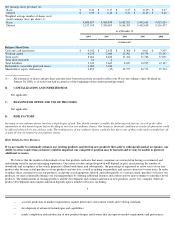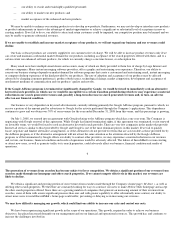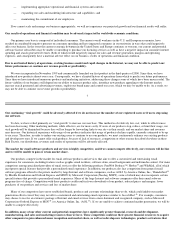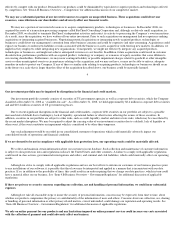Incredimail 2008 Annual Report Download - page 17
Download and view the complete annual report
Please find page 17 of the 2008 Incredimail annual report below. You can navigate through the pages in the report by either clicking on the pages listed below, or by using the keyword search tool below to find specific information within the annual report.
Political, economic and military instability in the Middle East may impede our ability to operate and harm our financial results.
Our principal executive offices are located in Israel. Accordingly, political, economic and military conditions in the Middle East may affect
our business directly. Since the establishment of the State of Israel in 1948, a number of armed conflicts have occurred between Israel and its Arab
neighbors. During the winter of 2008, Israel was engaged in an armed conflict with Hamas, a militia group and political party operating in the
Gaza Strip, and during the summer of 2006, Israel was engaged in an armed conflict with Hezbollah, a Lebanese Islamist Shiite militia group and
political party. These conflicts involved missile strikes against civilian targets in various parts of Israel, and negatively affected business
conditions in Israel. Any hostilities involving Israel or the interruption or curtailment of trade between Israel and its present trading partners could
affect adversely our operations. Although Israel has entered into various agreements with the Palestinian Authority, Israel has been and is subject
to civil unrest and Palestinian terrorist activity, with varying levels of severity, since October 2000. Tension among the different Palestinian
factions may create additional unrest and uncertainty. Ongoing and revived hostilities and the attempts to resolve the conflict between Israel and
its Arab neighbors often results in political instability that affects the Israeli capital markets and can cause volatility in interest rates, exchange
rates and stock market quotes. These or other Israeli political or economic factors could harm our operations and product development and cause
our sales to decrease. Furthermore, several countries, principally those in the Middle East, still restrict business with Israel and Israeli companies
and, although the impact of these restrictions is not as important for a company such as ours that sells its products through the Internet, it may
nevertheless have an adverse effect on our results of operations.
16
Our operations may be disrupted by the obligations of our personnel to perform military service.
Many of our male employees in Israel, including members of senior management, are obligated to perform up to 36 days of military reserve
duty annually until they reach age 48 and, in the event of a military conflict, could be called to active duty. Our operations could be disrupted by
the absence of a significant number of our employees related to military service or the absence for extended periods of military service of one or
more of our key employees.
Investors and our shareholders generally may have difficulties enforcing a U.S. judgment against us, our executive officers and our
directors or asserting U.S. securities laws claims in Israel.
We are incorporated in Israel and all of our executive officers and most of our directors reside outside the United States. Service of process
upon them may be difficult to effect within the United States. Furthermore, all of our assets and most of the assets of our executive officers and
directors are located outside the United States. Therefore, a judgment obtained against us or any of them in the United States, including one based
on the civil liability provisions of the U.S. federal securities laws may not be collectible in the United States and may not be enforced by an Israeli
court. It also may be difficult for you to assert U.S. securities law claims in original actions instituted in Israel.
The tax benefits available to us require us to meet several conditions and may be terminated or reduced in the future, which would
increase our costs and taxes.
We have generated income and therefore, are able to take advantage of tax exemptions and reductions resulting from the “Approved
Enterprise” status of our facilities in Israel. To remain eligible for these tax benefits, we must continue to meet certain conditions stipulated in the
Law for the Encouragement of Capital Investments, 1959 (the “Investment Law”), and its regulations and the criteria set forth in the specific
certificate of approval. If we fail to meet the required conditions in the future, the tax benefits would be canceled and we could be required to
refund any tax benefits we have received with interest and adjustment for change in Israeli consumer price index. These tax benefits may not be
continued in the future at their current levels or at any level.
Effective April 1, 2005, the Investment Law was amended. As a result, the criteria for investments qualified to receive tax benefits as an
Approved Enterprise were revised. No assurance can be given that we will, in the future, be eligible to receive additional tax benefits under this
law. The termination or reduction of these tax benefits would increase our tax liability in the future, which would reduce our profits or increase
our losses. Additionally, if we increase our activities outside of Israel, for example, by future acquisitions, our increased activities might not be
eligible for inclusion in Israeli tax benefit programs. As a result of the amendment and recent interpretations, tax-exempt income generated under
the provisions of the new law will subject us to taxes upon distribution or liquidation and we may be required to record deferred tax liability with
respect to such tax-exempt income, possibly affecting our results in the future. See “Item 10.E Taxation – Israeli Taxation – Law for the
Encouragement of Capital Investments, 1959” for more information about these programs.
Risks Related to our Ordinary Shares and their Listing on a Stock Exchange
We incur significant costs as a result of being a public company.
As a public company, we incur significant legal, accounting and other expenses. We incur costs associated with our public company
reporting requirements as well as costs associated with corporate governance requirements, including requirements under the Sarbanes-Oxley Act
of 2002, the rules of the Nasdaq Stock Market, the provisions of the Israeli Securities Law that apply to dual listed companies (companies that are
listed on the Tel Aviv Stock Exchange (“TASE”) and another recognized stock exchange) and the provisions of the Israeli Companies Law that
apply to public companies. For example, as a public company, we have created additional board committees and are required to have two external
























